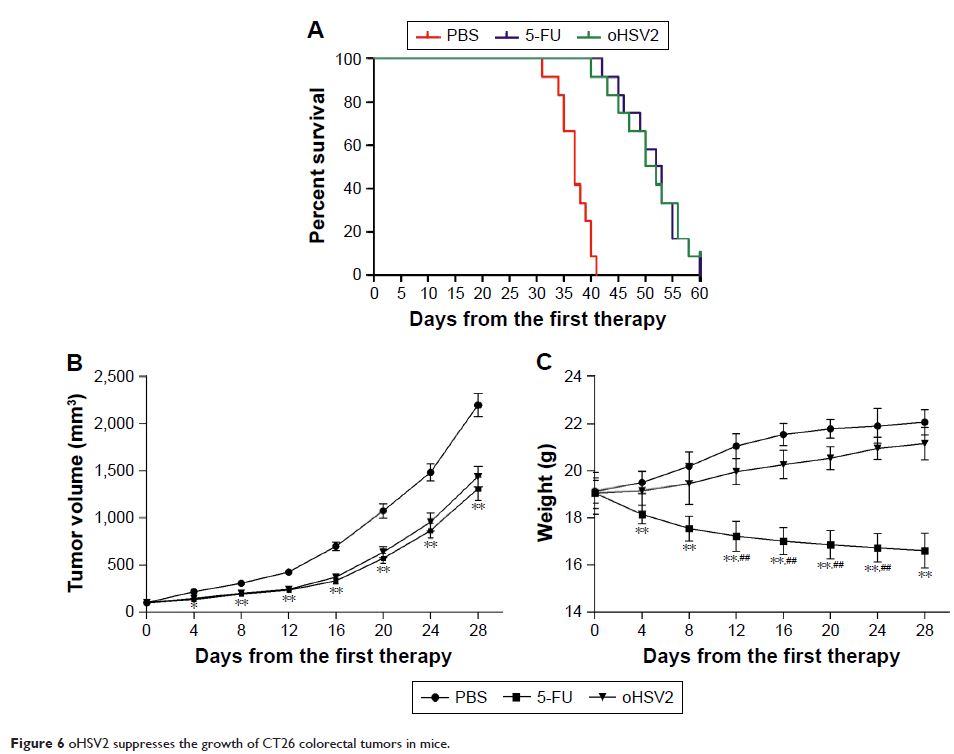109568
论文已发表
注册即可获取德孚的最新动态
IF 收录期刊
- 3.4 Breast Cancer (Dove Med Press)
- 3.2 Clin Epidemiol
- 2.6 Cancer Manag Res
- 2.9 Infect Drug Resist
- 3.7 Clin Interv Aging
- 5.1 Drug Des Dev Ther
- 3.1 Int J Chronic Obstr
- 6.6 Int J Nanomed
- 2.6 Int J Women's Health
- 2.9 Neuropsych Dis Treat
- 2.8 OncoTargets Ther
- 2.0 Patient Prefer Adher
- 2.2 Ther Clin Risk Manag
- 2.5 J Pain Res
- 3.0 Diabet Metab Synd Ob
- 3.2 Psychol Res Behav Ma
- 3.4 Nat Sci Sleep
- 1.8 Pharmgenomics Pers Med
- 2.0 Risk Manag Healthc Policy
- 4.1 J Inflamm Res
- 2.0 Int J Gen Med
- 3.4 J Hepatocell Carcinoma
- 3.0 J Asthma Allergy
- 2.2 Clin Cosmet Investig Dermatol
- 2.4 J Multidiscip Healthc

溶瘤性单纯疱疹病毒 2 型在体外和体内对结肠直肠癌的抗肿瘤作用
Authors Yin L, Zhao C, Han J, Li Z, Zhen Y, Xiao R, Xu Z, Sun Y
Received 23 November 2016
Accepted for publication 22 December 2016
Published 7 February 2017 Volume 2017:13 Pages 117—130
DOI https://doi.org/10.2147/TCRM.S128575
Checked for plagiarism Yes
Review by Single-blind
Peer reviewers approved by Dr Hoa Le
Peer reviewer comments 2
Editor who approved publication: Professor Deyun Wang
Background: The incidence of colorectal cancer (CRC) is on the rise. Furthermore,
late-stage diagnoses and limited efficacious treatment options make CRC a
complex clinical challenge. Therefore, a new therapeutic regimen with a
completely novel therapeutic mechanism is necessary for CRC. In the present
study, the therapeutic efficacy of oncolytic herpes simplex virus type 2
(oHSV2) in CRC was assessed in vitro and in vivo. oHSV2 is an oncolytic agent
derived from herpes simplex virus type 2 that encodes granulocyte-macrophage
colony-stimulating factor.
Materials and
methods: We investigated the cytopathic effects
of oHSV2 in CRC cell lines using the MTT assay. Then, cell cycle progression
and apoptosis of oHSV2 were examined by flow cytometry. We generated a model of
CRC with mouse CRC cell CT26 in BALB/c mice. The antitumor effects and adaptive
immune response of oHSV2 were assessed in tumor-bearing mice. The therapeutic
efficacy of oHSV2 was compared with the traditional chemotherapeutic agent,
5-fluorouracil.
Results: The in vitro data showed that oHSV2 infected the CRC cell lines
successfully and that the tumor cells formed a significant number of syncytiae
postinfection. The oHSV2 killed cancer cells independent of the cell cycle and
mainly caused tumor cells necrosis. The in vivo results showed that oHSV2 significantly
inhibited tumor growth and prolonged survival of tumor-bearing mice without
weight loss. With virus replication, oHSV2 not only resulted in a reduction of
myeloid-derived suppressor cells and regulatory T cells in the spleen, but also
increased the number of mature dendritic cells in tumor-draining lymph nodes
and the effective CD4+T and CD8+T-cells in the tumor
microenvironment.
Conclusion: Our study provides the first evidence that oHSV2 induces cell death in
CRC in vitro and in vivo. These findings indicate that oHSV2 is an effective
therapeutic cancer candidate that causes an oncolytic effect and recruits
adaptive immune responses for an enhanced therapeutic impact, thus providing a
potential therapeutic tool for treatment of CRC.
Keywords: colorectal cancer, oncolytic virus, herpes simplex virus type 2,
granulocyte–macrophage colony-stimulating factor, immunotherapy, gene therapy
